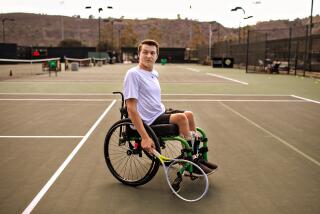For Wheelchair Tennis Athletes, Former Therapy Is Serious Sport
- Share via
This was the Big Time. They came from Australia, England, the Netherlands, Alabama, Tennessee--California, too--to play in the Seventh Annual World Wheelchair Tennis Invitational. The prize money was the largest it has ever been--$12,000.
“The significance of the event is that we are showcasing the best men and women in the world,” said David Kiley, winner of the men’s doubles, with his partner Randy Snow, and host athlete for the event.
Eight men and seven women competed in the tournament, which began Thursday.
Championship wheelchair tennis--as played Saturday at the South End Racquet and Health Club in Torrance--now is far more than therapy for the victims of broken backs.
It has become a game of flat hard serves, deceitful returns and dazzling chair spins. The only concession to limited mobility is a two-bounce rule.
The guys have mitt-crushing handshakes, biceps bigger than their atrophied thighs, shoulders you could walk on--and the steely-eyed stares of competitors as fierce as any in able-bodied sports.
“We’re out here to win,” said Kiley, 35. “We aren’t out to prove any point about courage. The game is three times as hard as playing with your feet.”
Dubbed “the best all-around wheelchair athlete in the United States,” Kiley is an unusual exemplar of the rule “once a jock, always a jock.”
He works out five days a week, several hours a day, lifting weights, getting aerobic conditioning. He can rip off three sets of 20 chin-ups.
A member of the U.S. Wheelchair Basketball team that won the gold medal in the 1988 Paralympic Games in Seoul, he led the Casa Colina Condors to six national championships in the last nine years and has been named Most Valuable Player five times by the National Wheelchair Basketball Assn.
He broke his back 16 years ago when an inner tube he was riding down a snowy hill at Big Bear struck a tree.
“I was an athlete. That was all I did,” he said. “I didn’t care about anything but sports.” A point guard for the Mater Dei High School in Santa Ana, he became introduced to wheelchair basketball while undergoing rehabilitation.
At first, he was skeptical.
“I said, ‘Wheelchair basketball, give me a break!’ But this guy broke my stereotypes real fast.” It was the coach of a wheelchair basketball team: He was dropping in back shots one after another, and Kiley decided to join in.
‘For My Ego’
In the beginning, the sport was physical and mental therapy.
“I needed something for my ego,” Kiley said.
But the old competitive juices started flowing. He took up tennis, skiing, got married, became sports director of the Pomona-based Casa Colina Centers for Rehabilitation, which sponsored Saturday’s tournament--and his ego no longer needed the boost, he said.
Now he is in sports to excel.
“I never would have been at the top of any able-bodied sports. I have been most fortunate to be at the top of wheelchair sports,” he said.
But apart from the personal goal, Kiley and other wheelchair sports activists also make the point that many with spinal cord injuries can do a lot more than was dreamed possible before.
‘A Common Fallacy’
For example, the two children he fathered.
“It’s a common fallacy that disabled people cannot enjoy the finer parts of life,” he said, with a knowing smile. “The doctors told me I couldn’t have kids. Huh, that’s what they know. You have to learn not to listen.”
Returning to the day’s event, Kiley said that he hopes someday people will watch wheelchair tennis on national television networks for its value as pure sport.
“We believe that wheelchair tennis will become that attractive,” he said.
FINAL RESULTS:
Men’s doubles: David Kiley of San Dimas (ranked No. 3 in the world) and Randy Snow, Birmingham, Ala. (No. 1).
Women’s doubles: Monique Van Den Bosch of the Netherlands (No. 2) and Jan McMorran of England (No. 8).
Women’s singles: Monique Van Den Bosch.
Men’s singles: Randy Snow.
More to Read
Go beyond the scoreboard
Get the latest on L.A.'s teams in the daily Sports Report newsletter.
You may occasionally receive promotional content from the Los Angeles Times.










